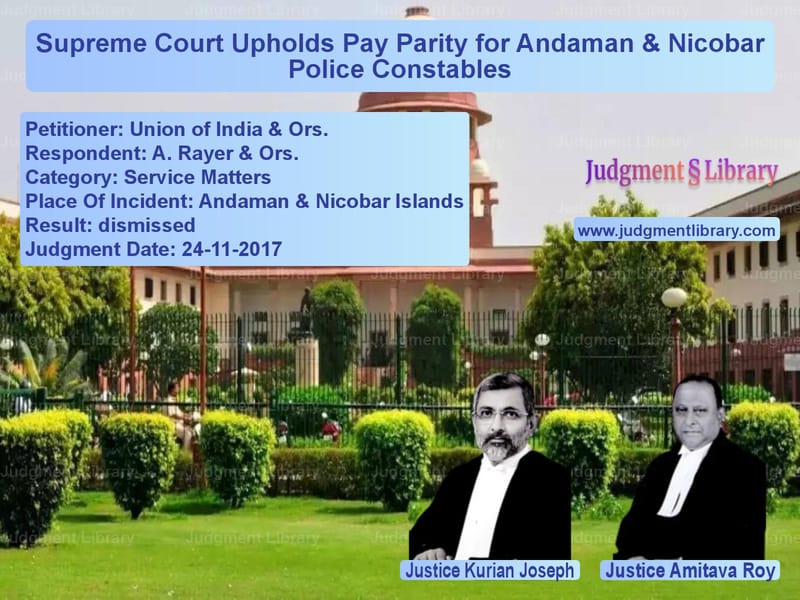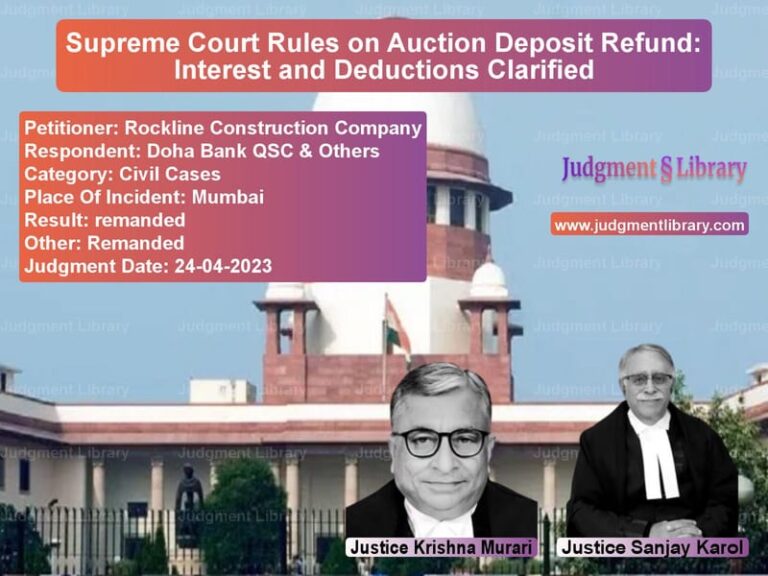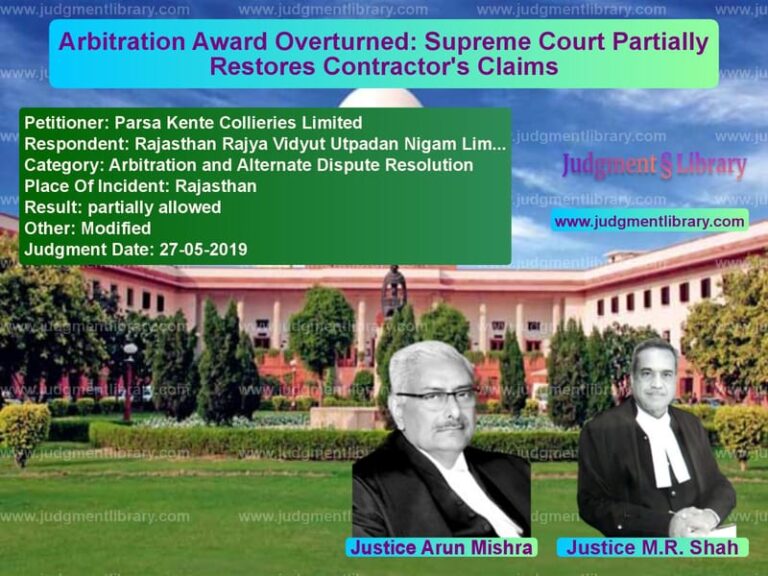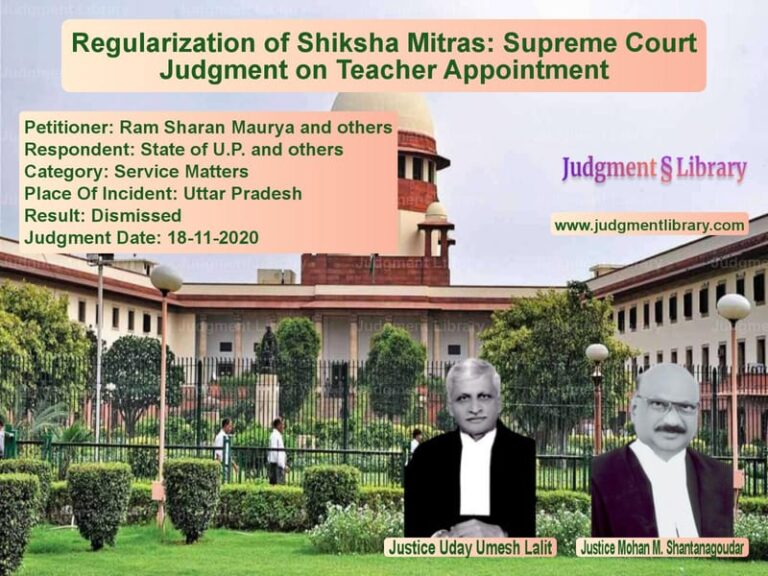Supreme Court Upholds Pay Parity for Andaman & Nicobar Police Constables
The Supreme Court of India, in the case of Union of India & Ors. vs. A. Rayer & Ors., addressed the issue of pay disparity among police constables serving in the Union Territory of Andaman & Nicobar Islands and those serving in Delhi. The Court upheld the decision of the Central Administrative Tribunal (CAT) and the High Court, which had ruled in favor of granting pay parity to the Andaman & Nicobar police constables.
Background of the Case
The dispute arose when the police constables serving in Andaman & Nicobar Islands claimed that they were entitled to the same pay scale as their counterparts in Delhi. They relied on the recommendation of the Anomaly Committee, which had suggested that police constables in the Andaman & Nicobar Islands should be granted pay parity with Delhi Police constables. However, the Union of India did not implement this recommendation, prompting the constables to challenge the decision before the Central Administrative Tribunal.
The Tribunal ruled in favor of the constables, and this decision was upheld by the High Court of Calcutta’s Circuit Bench at Port Blair. The Union of India then appealed to the Supreme Court, challenging the orders passed by the Tribunal and the High Court.
Key Legal Issues
The Supreme Court examined the following legal issues:
- Whether the classification between matriculate and non-matriculate constables in pay fixation was permissible.
- Whether the recommendations of the Anomaly Committee were binding on the government.
- Whether the Supreme Court should exercise its jurisdiction under Article 136 of the Constitution to interfere with the findings of the Tribunal and the High Court.
Petitioner’s Arguments
The Union of India, represented by its legal counsel, argued that:
- Pay fixation for government employees involves policy decisions that should not be interfered with by the courts.
- The classification between matriculate and non-matriculate constables was a legitimate distinction based on educational qualifications.
- The recommendations of the Anomaly Committee were not binding on the government.
- The Tribunal and the High Court had erred in extending the Delhi Police pay scale to Andaman & Nicobar police constables.
Respondent’s Arguments
The respondents, represented by their legal counsel, contended that:
- The government had failed to implement the recommendation of the Anomaly Committee, which had found that Andaman & Nicobar police constables were entitled to pay parity with Delhi Police constables.
- There was no justifiable reason to deny equal pay when both sets of constables performed similar duties.
- The decision of the Tribunal and the High Court was based on sound reasoning and should not be overturned.
Supreme Court’s Observations
The Supreme Court, led by Justices Kurian Joseph and Amitava Roy, considered the arguments of both parties and made the following observations:
- The Court acknowledged the precedent set in State of Mysore vs. P. Narasinga Rao, which permitted classification between matriculate and non-matriculate employees.
- The key issue was not about the classification but rather the implementation of the Anomaly Committee’s recommendation.
- While the government was not legally bound to implement the recommendations of the Anomaly Committee, the Tribunal and the High Court had correctly found that the government had no justifiable reason for rejecting the recommendation.
- The Court noted that it should exercise its jurisdiction under Article 136 sparingly and that there was no compelling reason to interfere with the concurrent findings of the Tribunal and the High Court.
The Court stated:
“In our considered view, we do not find any justifiable ground to exercise our jurisdiction under Article 136 of the Constitution of India. The appeal, accordingly, stands dismissed.”
Final Judgment
The Supreme Court ruled as follows:
- The appeal filed by the Union of India was dismissed.
- The order of the High Court and the Tribunal granting pay parity to Andaman & Nicobar police constables was upheld.
- The default cost imposed by the High Court, which required payment of arrears with 8% interest, was vacated.
- However, the Court directed that if the arrears were not paid within six months, the High Court’s order on interest would be revived.
- No further extension of time for payment of arrears would be granted.
Implications of the Judgment
This ruling has significant implications for government employees and pay parity claims:
1. Recognition of Anomaly Committee’s Recommendations
While the Court held that the government is not legally bound to implement the Anomaly Committee’s recommendations, it emphasized that such recommendations should not be ignored without justifiable reasons.
2. Limitation on Judicial Review in Pay Fixation Matters
The judgment underscores that courts should exercise caution in interfering with government pay policies unless there is clear evidence of discrimination or arbitrary decision-making.
3. Strengthening Pay Parity Claims
The ruling sets a precedent for similar pay parity cases, particularly where employees performing the same duties are denied equal pay.
4. Government’s Accountability in Pay-Related Disputes
The judgment reinforces that the government must provide valid reasons for not implementing committee recommendations related to employee benefits.
Conclusion
The Supreme Court’s decision in Union of India vs. A. Rayer reaffirms the principle of fair treatment in pay fixation matters. By upholding the Tribunal and High Court’s findings, the Court ensured that Andaman & Nicobar police constables receive fair compensation comparable to their counterparts in Delhi. This ruling serves as a significant milestone in the ongoing discussions on pay parity and employment rights in the public sector.
Don’t miss out on the full details! Download the complete judgment in PDF format below and gain valuable insights instantly!
Download Judgment: Union of India & Ors vs A. Rayer & Ors. Supreme Court of India Judgment Dated 24-11-2017.pdf
Direct Downlaod Judgment: Direct downlaod this Judgment
See all petitions in Employment Disputes
See all petitions in Public Sector Employees
See all petitions in Recruitment Policies
See all petitions in Judgment by Kurian Joseph
See all petitions in Judgment by Amitava Roy
See all petitions in dismissed
See all petitions in supreme court of India judgments November 2017
See all petitions in 2017 judgments
See all posts in Service Matters Category
See all allowed petitions in Service Matters Category
See all Dismissed petitions in Service Matters Category
See all partially allowed petitions in Service Matters Category







